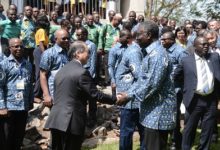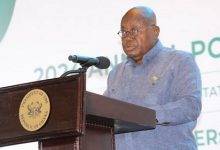The Minister of Works and Housing, Francis Asenso-Boakye, has called for a concerted effort among stakeholders in the security and real estate sectors of the country to combat money laundering.
“Given the advancement in technology and the borderless world, which is making it increasing difficult to track money launders, there is the need for collaboration among experts, to fight money laundering,” he added.
Mr Asenso-Boakye made the call in Accra yesterday, in a speech read on his behalf by Dr Freda Akosua Prempeh,the Minister of State, Ministry of Works and Housing, at a workshop on anti-money laundering and compliance with combating the financing of terrorism by real estate practitioners and agents.
The three-day programme is aimed at enhancing the capacity of participants on current and emerging money laundering risks.
It also seeks to promote cooperation, coordination and engagement amongst relevant competent authorities and real estate sector professionals on how to effectively implement strategies for anti-money laundering and combating terrorism financing.
The programme was organised by Economic Community of West African States (ECOWAS) in collaboration with the Inter-Government Action Group Against Money Laundering in West Africa (GIABA).
Mr Asenso-Boakye stated that the real estate sector had become an easy and convenient place where financial criminals hid their booty or convertible currencies from the state, thereby depriving the government of the requisite revenue for development projects.
The minister said money laundering, a form of financial crime, had become sophisticated, adding that the most prominent way in which this manifested itself was the real estate market, where criminals integrated illegally-acquired funds into legal economies to provide safe investments through the use of either direct cash or fictitious names to purchase properties.
“According to the Financial Action Task Force, the real estate sector accounted for up to 30 per cent of criminal assets confiscated worldwide between 2011 and 2013, he added.
He said the ministry, in its quest to adhere to international best practices as part of the promulgation of Real Estate Agency Act, 2020 (Act 1047), incorporated provisions to plug the avenues in which real estate transactions were used to launder money.
The Director General of GIABA, Justice Kimelabalou A.B.A, in a speech read on his behalf by Dr Buno Nduka, Director of Evaluation and Compliance, said the real estate sector was one of the main drivers of the economic growth and the engine of social stability across member states, which constitute an important part of economic development in the region.
He said the programme would provide supervisors, self-regulatory bodies and real estate professionals with the requisite knowledge on the vulnerability methods used by criminals in the real estate sector to launder money.
The Head of Information Technology (IT) Financial Intelligence Center (FIC), Mr Kofi Boateng, said the use of cash to finance real estate transaction, the unorganised nature of the sector, the operators’ ability to use large cash and poor regulation and communication made the sector attractive for money launderers.
He said the workshop would target real sector practitioners, relevant supervisory authorities, self-regulatory bodies and FIC to address the problem of money laundering and financing of terrorism.
The President of Ghana Real Estate Developers Association (GREDA), Mr Patrick Ebo Bonful, said GREDA, in collaboration with FIC, had trained members on how to identify red flags in real estate transactions and report such crimes.
He mentioned some of the risk areas for possible money laundering activities, as identified by GREDA, as manipulation of property values and barter trading.
BY ANITA NYARKO-YIRENKYI







